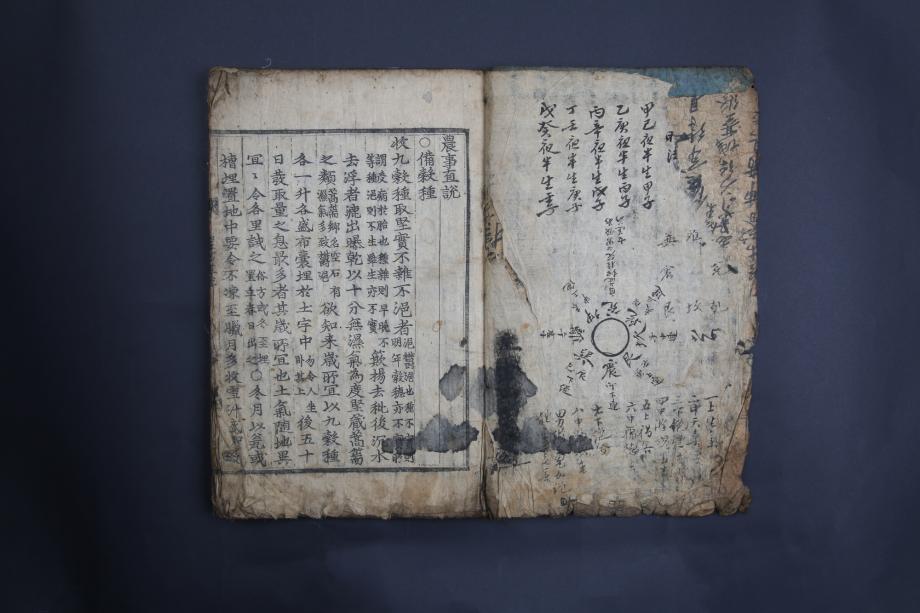아키비움 검색

시도지정 > 충북 유형문화유산
농사직설
- 한자명農事直說
- 영문명Unknown
- 지정일/등록일2024-07-12
- 관할시군제천시
- 이칭/별칭유형 413
문화재 설명정보
본래 『농사직설』은 중국과는 다른 우리나라의 토지에 맞게 곡식을 재배하기 위하여 1429년(세종 11) 정초(鄭招; ?~1434) 등이 간행하였다. 표지 이면과 발문 이후에 묵서의 흔적이 있으며 발문 끝에는'풍양후인 봉두조씨 가장(豊壤後人 鳳頭趙氏 家藏)'이라는 기록이 필사되어 있으며, 권말(卷末)에 ‘간암소장(澗菴所藏)’이라는 기록이 있다.
간암이라는 호를 사용한 인물로는 조선 후기 문신인 박치엽(朴致曄; 1790~1874)과 이인석(李寅碩, 1821~1858)이 있다. 간암(澗菴)이 정확히 누구를 가리키는 것인지는 알 수 없지만 이러한 소장 기록은 책의 전래 내역을 파악하는데 주요한 단서가 된다.
본 『농사직설』은 『농가집성』이 간행되기 바로 전해인 1654년 종식잡방(種植雜方) 등을 덧붙여 1654년(효종 5) 공주목사 신속과 충청도 관찰사 강백년, 충청도사 홍주세의 발문을 더해 간행하였다.
즉, 본 『농사직설』은 『농가집성』이 간행되기 직전 충청도 감영에서 자체적으로 간행한 사례이다. 본 『농사직설』은 『농가집성』이 간행되기 직전 충청도 감영에서 자체적으로 간행한 사례로 양란 이후 농업사와 인쇄문화를 이해할 수있는 자료이다.
간암이라는 호를 사용한 인물로는 조선 후기 문신인 박치엽(朴致曄; 1790~1874)과 이인석(李寅碩, 1821~1858)이 있다. 간암(澗菴)이 정확히 누구를 가리키는 것인지는 알 수 없지만 이러한 소장 기록은 책의 전래 내역을 파악하는데 주요한 단서가 된다.
본 『농사직설』은 『농가집성』이 간행되기 바로 전해인 1654년 종식잡방(種植雜方) 등을 덧붙여 1654년(효종 5) 공주목사 신속과 충청도 관찰사 강백년, 충청도사 홍주세의 발문을 더해 간행하였다.
즉, 본 『농사직설』은 『농가집성』이 간행되기 직전 충청도 감영에서 자체적으로 간행한 사례이다. 본 『농사직설』은 『농가집성』이 간행되기 직전 충청도 감영에서 자체적으로 간행한 사례로 양란 이후 농업사와 인쇄문화를 이해할 수있는 자료이다.
Nongsajikseol (lit. Straight Talk on Farming) is a book about Korean agriculture written by Jeong Cho (?-1434) and various other Joseon officials in 1429. Notably, it explains how to cultivate grains that are suitable for the land in Korea, which is different from that of China. There are traces of ink script on the back of the cover and the postscript, at the end of which is the phrase “Pungyanghuin bongdujossi gajang,” which means “Kept by the Pungyang Jo clan.” In addition, the record “Ganam sojang,” i.e. “Collection of Ganam,” appears at the end of the book.
Among persons who used the pen-name “Ganam” were Park Chi-yeop (1790-1874, a civil official of late Joseon) and Yi In-seok (1821-1858). However, although it is not clear who Ganam here refers to, these records provide useful clues for understanding the history of the book’s transmission.
This copy of Nongsajikseol was published in 1654 (the 5th year of the reign of King Hyojong), with the addition of Jongsikjapbang (a traditional method of seeding crops) prior to the publication of Nonggajipseong (Collection of Previous Works on Farming), as well as the postscripts of Sin Sok (the magistrate of Gongju), Gang Baek-nyeon (Chungcheong Provincial Governor), and Hong Ju-se (Chungcheong Assistant Governor).
As this copy was published by the Chungcheong Provincial Office before the publication of Nonggajipseong, it is an important material for understanding various aspects of agriculture and the printing culture of Joseon after the Japanese invasions of Korea and the Qing (Manchu) invasion of Korea.
Among persons who used the pen-name “Ganam” were Park Chi-yeop (1790-1874, a civil official of late Joseon) and Yi In-seok (1821-1858). However, although it is not clear who Ganam here refers to, these records provide useful clues for understanding the history of the book’s transmission.
This copy of Nongsajikseol was published in 1654 (the 5th year of the reign of King Hyojong), with the addition of Jongsikjapbang (a traditional method of seeding crops) prior to the publication of Nonggajipseong (Collection of Previous Works on Farming), as well as the postscripts of Sin Sok (the magistrate of Gongju), Gang Baek-nyeon (Chungcheong Provincial Governor), and Hong Ju-se (Chungcheong Assistant Governor).
As this copy was published by the Chungcheong Provincial Office before the publication of Nonggajipseong, it is an important material for understanding various aspects of agriculture and the printing culture of Joseon after the Japanese invasions of Korea and the Qing (Manchu) invasion of Korea.
문화유산 상세정보
제 0413 호
유형 413
기록유산 > 전적류 > 목판본
산업/생업 > 관련도서 > 농업 > 기타
조선시대
제천시
2024-07-12
-
전적ㆍ서적ㆍ고문서>전적류
-
지류
선장본(線裝本)
목판본
27.0cm×17.6cm
1권1책
-
대표 소재지 공개
27137충청북도 제천시 의림대로47길 7(모산동)
소유 관리 점유 정보
참고문헌
이미지
동영상
- 자료가 없습니다.
음원
- 자료가 없습니다.
문서
- 자료가 없습니다.
도면
- 자료가 없습니다.
3D
- 자료가 없습니다.
원시자료
- 자료가 없습니다.